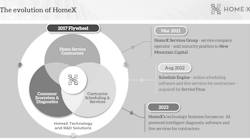This is the third in a series of articles by Matt Michel about how to stay positive when we’re surrounded by bad news and negativity. If you missed the previous article, click here to read it.
You Set The Tone
You’re the boss. No one tries to motivate the boss. It’s your job to reassure and pump up the people around you. But who motivates you? Probably, no one. As boss, you must rely on self-motivation.
It’s important for you to stay positive and even keeled. Your employees feed off you, seeing your every mood and action out of proportion. The highs are higher and lows are lower.
Within limits, your employees’ attitudes are a reflection of yours. Of course, even if you have the sunniest disposition, the grump employee will still be a grump. But, he might not be as big of a grump.
And If You Don’t Set The Tone?
What if you’re not the boss? A positive attitude is still important. First, no one wants to hang around a grump.
Second, optimists are more successful. Studies by Harvard and Stanford found that 15% of an individual’s success is due to technical skills and 85% is due to attitude. This makes sense, if you believe you reap what you sow and believe the world reflects your attitude back at you.
Third, optimists are healthier. In the 1988 paper, "Pessimistic Explanatory Style as a Risk Factor for Physical Illness: A Thirty-five Year Longitudinal Study,” published in the “Journal of Personality and Social Psychology,” it was reported that optimistic people live longer, suffer from fewer, less severe diseases, and are generally healthier than pessimists.
Whether you’re the boss or not, it’s harder than ever to stay positive, more important than ever to stay positive, and no one’s going to help. So how do you manage it? I’ve come up with a set of simple ways to stay positive in a negative world.
Some of them may work for you, while others do not. Some might work for a while, but lose effectiveness over time or with repetition. That’s why there are a lot of them.
1. Set Goals. People with clear written goals are more positive, by definition. If you have goals to focus on, you are focusing forward, toward the future, and not on the negative day-to-day. Goals help you move forward in a positive direction.
2. Identify Attainable Goals. No matter what kind of goal setting process I engage in, it’s unlikely I’m ever going to become an NBA forward. I’m too short, too fat, too old, and limited by a six inch vertical leap. If I were to focus on NBA stardom, I would set myself up for failure. I would be putting myself in a position where life would beat me down.
Set attainable goals. Near term goals should be just out or reach, but not out of sight. They should be near enough that you can see them, but out of reach so you must stretch.
3. Keep the End in Mind. Even with attainable goals, setbacks are inevitable. How we respond to them is our choice. The negative response is to see a setback as a failure. The positive response is to recognize it as a mere setback that delays, but does not halt you. To keep setbacks in perspective, look beyond them to the end goals, the big goals that may take years to accomplish.
End goals are not easily attainable. They are major goals that inspire and motivate. On May 25, 1961, President Kennedy said, “I believe that this nation should commit itself to achieving the goal, before this decade is out, of landing a man on the moon and returning him safely to the earth.”
Kennedy declared an end goal. He did not know exactly how it would be accomplished. No one did. But the goal gave the space program an end goal to focus on and keep at the forefront when the inevitable setbacks occurred. The tragic deaths of astronauts Grissom, White, and Chaffee during a mission test early in 1967 (unofficially called Apollo 1) did not derail the Apollo program. Two years later, Neil Armstrong became the first person to walk on the moon on July 20, 1969.
Compare the different responses to Challenger explosion. When the Challenger tragically exploded early January 28, 1986, the space program lacked a similar end goal to putting a man on the moon. Without an end goal, the Challenger was more than a setback. It nearly marked the end of the space program. We did not resume manned spaceflight until December 29, 1988, nearly three years later.
When the Columbia broke up upon re-entry on February 1, 2003, the shuttle program was questioned again. It was two and a half years before spaceflight resumed with the Discovery on July 26, 2005.
The response to setbacks in the moon program was positive. We wept and mourned, but pressed on. The end goal was the focus. The response to setbacks in the space shuttle program could not have been more different. Perspective was lost. The setbacks, while tragic, were magnified in importance.
The same situation is on display with the Iraq War. Detractors do not see an end goal and thus, view every setback disproportionately large. Supporters of the war are focused on the end goal of Middle Eastern peace and democracy.
On a more personal level, almost every student experiences a poor grade on a test or paper from time to time. Students who obsess on the poor performance magnify it. They surround themselves with negative thoughts and energy. They are more likely to get frustrated, repeat the performance, drop the course, or drop out.
Those who focus on the end goal of graduation tend to see a poor grade as a minor setback. They don’t let it affect the long term “mission” of earning the degree or certification. Keeping focused on the end allows them to stay positive.
4. Practice Positive Self Talk. Too many people program themselves with negative thoughts. Motivational speaker and psychologist, Denis Waitley, was Chairman of Psychology on the U. S. Olympic Committee's Sports Medicine Council. Waitley worked with U. S. Olympic athletes to improve their performances. According to Waitley, top athletes program their minds for success, for positive performance.
Waitley says the mind records self talk like a robot. Whatever you program, gets played back. The mind moves in the direction of the currently dominant thought. When, for example, you stand in the tee box telling yourself, “Don’t slice. Don’t slice,” you’re engaging in negative self-talk. Your robotic subconscious cannot distinguish between positive and negative. It only knows “slice.” So you do.
Instead of focusing on what not to do (negative self talk), focus on what you want (positive self talk). Instead of saying, “Don’t slice,” tell yourself “Straight down the fairway.”
Top performing athletes focus on the outcomes they want. So should you. If you believe you can or cannot accomplish a deed, you are probably correct.
5. Recall Victory. The Dallas Cowboys were one of the first professional sports franchises to employ the use of sensory deprivation tanks. Other teams and top athletes from other sports (e.g., Carl Lewis, when preparing for the 1988 Olympics) have followed. The player floats in the tank while viewing videos of his best plays on the field.
The athletes are recalling moments of victory. You can as well. You do not need a state-of-the-art sensory deprivation tank to recall victory. Relive past moments of success and victory in your life. Recalling victories not only helps you repeat them, it gives you a victorious outlook.
Matt Michel is the CEO of the Service Roundtable, an alliance of HVAC and plumbing contractors. For just $50, contractors receive access to millions of dollars of downloadable, customizable, sales, marketing, and business tools that are certain to grow your sales, build your bottom line, and give you more time for your family. Give it a try. Matt says he’s “positive” you’ll like it.
If you would like to contact Matt, you can reach him at [email protected], toll free at 877.262.3341, or on his mobile at 214.995.8889. You can subscribe to his Comanche Marketing newsletter at www.ComancheMarketing.com.
Latest from Residential HVAC
Latest from Residential HVAC
Sponsored Content
Critical Challenges Facing HVACR Contractors in 2024
April 11, 2024
WINNER ANNOUNCED IN SERVICE BRACKET CHALLENGE!
April 5, 2024
Can Technology Address the Skilled Workforce Crisis?
Jan. 30, 2024
HomeX Plans More and Better Things for 2024
Jan. 3, 2024








